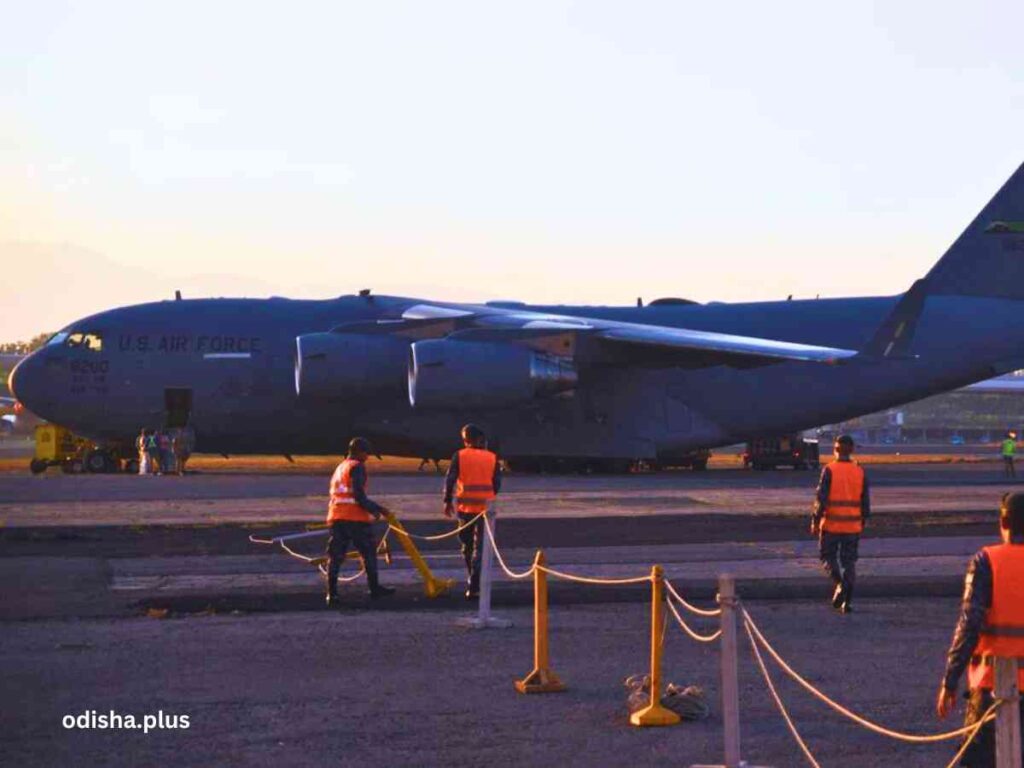The deportation has fueled substantial discussion about immigration policy’s complexities and its human cost
Bhaskar Parichha

The deportation of undocumented migrants from the United States, including those hailing from India, is a longstanding issue that has persisted for decades. Each year, data reveals that hundreds of individuals are forcibly returned to India due to their lack of legal status in the US. This ongoing situation was brought to the forefront by External Affairs Minister S. Jaishankar during a recent session in Parliament, where he addressed the complexities surrounding the issue. His position is particularly challenging, as both India and the United States are navigating new pressures in their foreign policy landscapes, often shaped by a growing need for performative patriotism that can complicate diplomatic relations.
The image of 104 Indian nationals being returned on a US military aircraft, restrained and shackled, is indeed a distressing sight. However, it is crucial to contextualize this event within a larger framework. While it is entirely human to feel compassion for those facing deportation, their plight underscores deeper systemic inequalities that exist both between nations and within them. These disparities warrant a more profound and nuanced discussion, rather than being reduced to mere political posturing or opportunistic rhetoric.
Unrestricted Citizenship
It is important to recognize that no country allows for unrestricted citizenship, and the issue of illegal immigration has been a contentious topic in US politics for over thirty years. The discourse surrounding this issue has often been fraught with racial undertones, particularly during the campaigns of former President Donald Trump, who made immigration a central theme of his political platform. His administration’s focus on deportations can be seen as an effort to appease a segment of his political base that prioritizes strict immigration enforcement.
However, it is essential to note that deportations are not a new phenomenon; similar actions have been taken by previous administrations, both Democratic and Republican, indicating that this issue transcends party lines and reflects broader societal attitudes toward immigration.
In light of these complexities, it is imperative to engage in a more comprehensive dialogue about immigration policies, the human rights of migrants, and the socio-economic factors that drive individuals to seek a better life in another country. Addressing these underlying issues requires a collaborative approach that goes beyond political expediency and seeks to foster understanding and compassion for those affected by such policies. Only through such discussions can we hope to create a more just and equitable system that respects the dignity of all individuals, regardless of their immigration status.
Geopolitical Dynamics
The practice of detaining passengers has been an integral part of the US Immigration and Customs Enforcement (ICE) process since November 19, 2012. This policy, while aimed at enforcing immigration laws and ensuring national security, has sparked significant debate and concern among various stakeholders, including human rights advocates, legal experts, and the general public. Critics argue that such detentions can lead to the violation of individual rights and create a climate of fear among immigrant communities. Furthermore, the implications of these practices extend beyond immigration alone, as they intersect with broader geopolitical dynamics.
At a time when international relations are undergoing significant transformations, migration is just one of many pressing issues that the United States and India must navigate. Both nations are grappling with rising protectionism, which has manifested in various forms, including discussions about tariffs and trade barriers. These economic policies not only affect bilateral trade but also have far-reaching consequences for global supply chains and economic stability. As both countries seek to protect their domestic industries, the potential for increased tensions and conflicts over trade policies looms large.
India’s Position
In India, the recent deportation of individuals has provided the Opposition with a renewed opportunity to critique the ruling government. This political maneuvering comes at a time when the government has faced challenges in articulating a coherent and unified response to various issues since last year’s general elections. The Opposition has seized upon the deportations as a means to highlight perceived failures in governance and to question the government’s commitment to upholding human rights and due process.
However, the political landscape in India is complex, characterized by a multitude of parties with divergent interests. This fragmentation often complicates the Opposition’s efforts to hold the government accountable, as party interests can overshadow the pursuit of critical issues that affect the populace.
As the political discourse continues to evolve, it remains essential for both the US and India to address the multifaceted challenges they face. This includes not only immigration and trade but also the need for a more comprehensive approach to international relations that prioritizes cooperation, dialogue, and mutual understanding. The interplay of domestic politics and international issues will undoubtedly shape the future of both nations, making it imperative for leaders to navigate these waters with care and foresight.
The deportation incident has sparked significant debate across various platforms, highlighting the complexities of immigration policy and the human stories behind it. However, it is crucial to recognize that merely engaging in political posturing or using the situation as a tool for electoral gain does not address the underlying issues that contribute to the current immigration crisis.
Western Democracies
In many Western democracies, there exists a palpable struggle within liberal systems to effectively navigate the rising tide of anti-immigrant sentiments. These sentiments are often fueled by misinformation and a lack of nuanced understanding regarding the different categories of migration. The public discourse frequently conflates legal migration with illegal border crossings, leading to a dangerous oversimplification of a multifaceted issue.
This conflation results in the unjust vilification of asylum seekers and refugees, who are often fleeing dire circumstances such as war, persecution, or natural disasters. By grouping these vulnerable populations with criminals, society not only misrepresents the challenges they face but also exacerbates existing societal tensions and fears surrounding immigration. This misunderstanding can lead to a climate of hostility and division, where individuals are viewed through a lens of suspicion rather than empathy.
Moreover, the political narrative surrounding immigration often fails to address the root causes of migration, such as economic instability, violence, and environmental degradation in home countries. By focusing solely on the symptoms—such as border security and deportation—policymakers neglect the broader context that drives people to seek refuge or a better life elsewhere.
Compassionate Dialogue
To foster a more informed and compassionate dialogue about immigration, it is essential to promote education and awareness about the complexities of migration. This includes distinguishing between different types of migrants, understanding their motivations, and recognizing the contributions they make to society. Only through a comprehensive approach that considers the human aspect of migration we can hope to create policies that are both just and effective, ultimately leading to a more cohesive and understanding society.
While the deportation incident may serve as a flashpoint for political debate, we must look beyond the immediate controversy and engage in a deeper examination of the issues at hand. By doing so, we can work towards solutions that not only address the concerns of citizens but also uphold the dignity and rights of those seeking safety and a better life.
Host countries are facing growing worries about social unity and national identity, making discussions about immigration more intense. When immigrants are seen as dangerous to social stability, it can create fear and division, which goes against the principles of inclusivity and diversity that many democratic societies promote.
(The author is a senior journalist and columnist. Views expressed are personal.)























